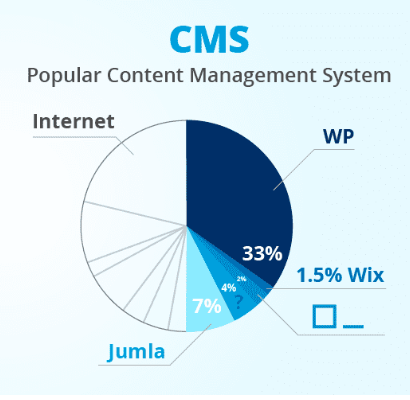

WordPress is the world’s most popular CMS or Content Management System. If you’re reading this, it’s likely you know that already. If you have heard of WordPress but don’t necessarily understand its vastness, let me sketch an outline for you. [right]
Today over 30% of the websites on the Internet are built using WordPress. It is the towering agent for managing content in this digital decade. But what does it mean to be an expert at WordPress? If you know WordPress and have it on your resume, what does that really mean? I believe with the way the Internet has and continues to evolve the very term “Wordpress” will soon be as generic of a name as “Kleenex” is to the disposable tissue we use, or “Google” to search engines. Here are 3 reasons why I believe this to be true.
The Good: WordPress Has More Service & Support Providers
From a business standpoint, WordPress is the right platform to build your website on. It has more website service providers that support it than any other hosting service, which is just another reason why it is the most popular CMS today. Working with a company like Squarespace or Wix puts you at their mercy for support of your website, and they can charge you whatever they like. As a business owner who needs a website are you going to risk overpaying for support of your website if you don’t have to–and can prevent it by using the most popular website building platform on earth in 2020?
The Bad: The WordPress CMS Doesn’t Have A Strong Enough Foundation

It’s not that WordPress itself doesn’t have a strong foundation, in fact it’s the strongest website foundation our generation has at its fingertips–but from a software development perspective it’s more work to maintain software built on top of an operating system that it was not intended for.
When you think of the most common computer operating systems out there today the first two that come to mind are the Windows and MAC OS. The very first modern versions of these operating systems in the early 90s were simple and to the point. Over the past 3 decades they have become more advanced constantly adding and updating new functionality.. WordPress is different. WordPress has stayed relatively the same since its early years. What happens as a result of this is when we install new software on our WordPress operating system (known as Plugins), that software has to work a little harder to operate within WordPress. Additionally, website hosting companies have to work harder to meet the demand for support. In essence the whole galaxy has to revolve around this small, seemingly innocuous, immovable object – which isn’t necessarily a bad thing!
This is due in part that the Internet is still in its infancy. Forty years ago the Internet didn’t affect the way a business operated or people go about living their daily lives. Two thousand years from now it will still affect both of those things. Culturally we need to be more grounded in the reality that the way the world operates around technology in 2020 isn’t logical, just, or necessarily healthy for that matter. It’s operated like a business and businesses are good at making money. If we accept this truth it will save you a lot of headache in the long run, this I can promise!
The Real Truth: The Evolution of Website Hosting Service Providers
The easy fixes for WordPress require you to have mastery ability to manage a website’s caching, DNS, CDN, PHP, SSL and SSH. The most common reason a WordPress website will crash is because one component of the website will update at a different time than others. The most common component to break your website will always be an update to either the WordPress operating system itself or to one of the many plugins you have installed. In 2020 any website hosting service provider must have complete mastery over these tools in order to ensure they are able to get their client’s website back up and running quickly after an update or website crash.
So you may know how to update a page or post on a WordPress website, but are you capable of remedying common issues that arrive from using it? The main point I want you to take from my article today is that when a company says they offer “Wordpress support” or they are “Wordpress experts” take that with a grain of salt. The past and future evolution of the Internet points to the term “Wordpress” becoming more and more generic of a term. It continues to lose its meaning every day. What any WordPress-savvy company is really saying is they will do their best to prevent and remedy common issues your website may experience.
But don’t get me wrong, as I said before the fact that the Universe currently revolves around WordPress isn’t a bad thing. We live in an amazing generation in the evolution of the Internet. Let’s embrace and rejoice the fact that WordPress has lost its meaning, and start taking more advantage of the freedom we have.






[…] If you are here, its likely you work on WordPress websites, check out my last blog about why the very term WordPress has lost its meaning. […]